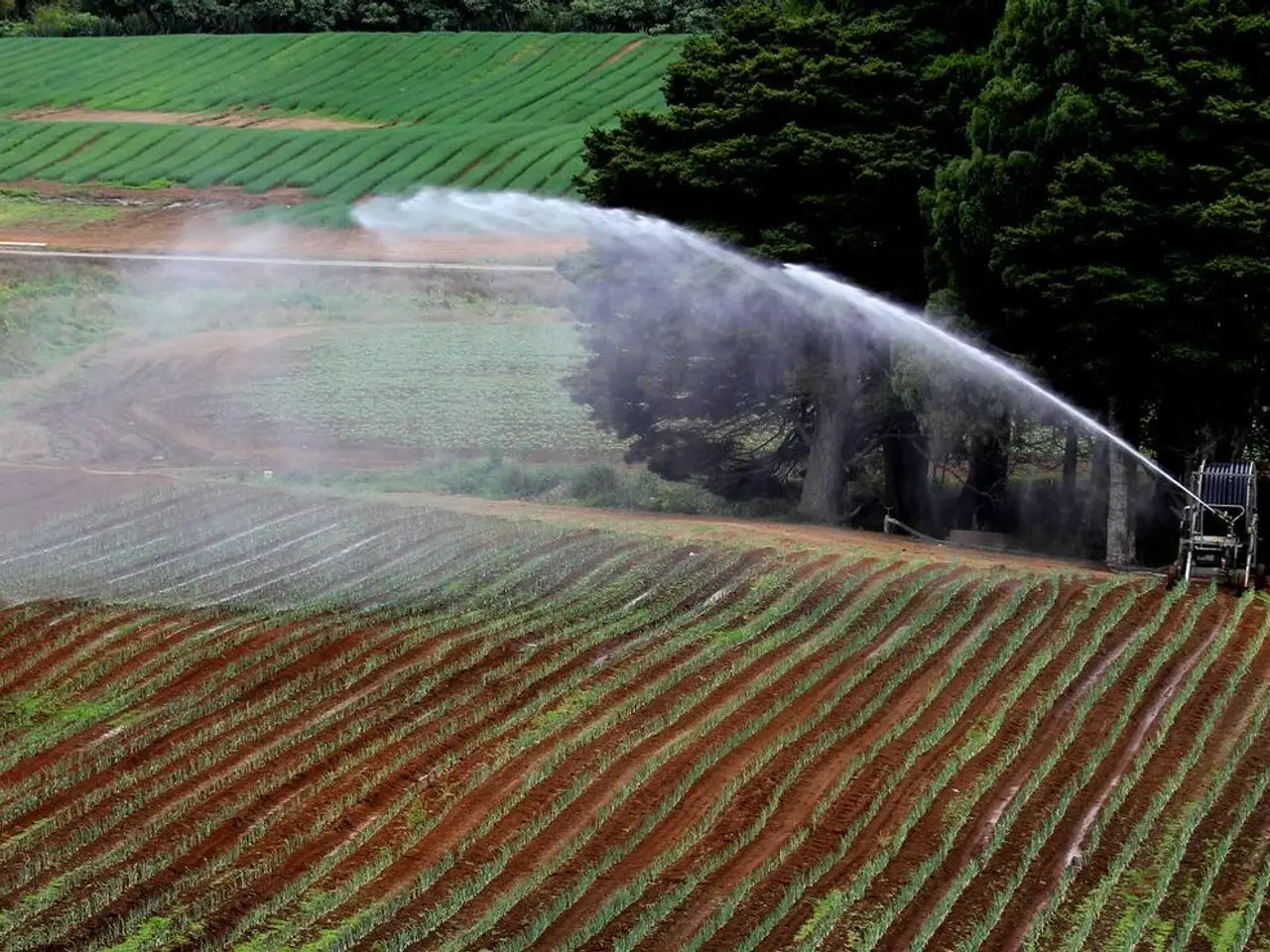Efficient Irrigation Strategies: Insights from Morocco's Experimentation
In the heart of North Africa, Morocco is leading a revolutionary shift towards water conservation in agriculture. The country's smart irrigation strategy, centred on the Green Morocco Plan (Plan Maroc Vert) and targeted funding initiatives, is transforming traditional irrigation methods and redefining farming practices.
The Green Morocco Plan, the backbone of Morocco’s smart irrigation strategy, promotes the replacement of traditional gravity-fed irrigation with efficient drip irrigation systems. These modern systems can reduce water use by 50–60%, a 47.8% lower water-to-harvest ratio compared to traditional methods. The plan aims to modernize approximately 555,000 hectares of irrigated farmland.
Over the past five years, Morocco’s Agricultural Development Fund (ADF) has allocated around $1 billion to upgrade irrigation infrastructure nationwide. This funding supports both large-scale farms and smallholders in implementing smart irrigation systems, improving water efficiency and productivity.
Morocco is also pioneering the use of renewable energy in agriculture. A national program aids farmers in acquiring solar-powered irrigation pumps, reducing dependency on fossil fuels and promoting environmentally friendly practices.
Large-scale infrastructure projects, such as the Jorf Lasfar–Khouribga desalinated water pipeline, indirectly support smart irrigation by freeing up freshwater previously used by industry for agricultural irrigation.
The World Bank has been instrumental in Morocco's water-saving efforts, supporting the National Irrigation Water Saving Program (PNEEI) and the Green Morocco Plan (PMV). By the end of 2022, the World Bank-backed project had improved water services for over 9,000 farmers, covering an area of 20,700 hectares.
Morocco's smart irrigation policies combine direct financial subsidies, large-scale modernization, and innovative renewable energy incentives to drive adoption of efficient water use technologies in agriculture. However, challenges remain, such as infrastructure bottlenecks, high upfront costs for smallholder farmers, and the need for technical knowledge among farmers.
To replicate Morocco's success in other African nations, it is recommended to develop comprehensive policy frameworks, foster public-private partnerships, design support systems for diverse farmer needs, invest in monitoring systems early, address infrastructure bottlenecks, and create accessible financing for small farmers.
As Morocco continues to lead the way in agricultural innovation, its smart irrigation strategies offer a promising model for sustainable water management in agriculture across the continent.
- The Green Morocco Plan, a key component of Morocco's smart irrigation strategy, encourages the switch from traditional gravity-fed irrigation to efficient drip irrigation systems, reducing water usage by up to 60%.
- In an effort to modernize agriculture, Morocco's Agricultural Development Fund (ADF) has allocated around $1 billion over the past five years to upgrade irrigation infrastructure across the country.
- Morocco is not only modernizing its farming practices, but also pioneering the use of renewable energy in agriculture, with a national program assisting farmers in acquiring solar-powered irrigation pumps.
- Large-scale infrastructure projects, such as the Jorf Lasfar–Khouribga desalinated water pipeline, are indirectly supporting smart irrigation by making freshwater previously used by industry available for agricultural purposes.
- The World Bank has supported Morocco's water-saving efforts by backing projects like the National Irrigation Water Saving Program (PNEEI) and the Green Morocco Plan (PMV), improving water services for over 9,000 farmers across 20,700 hectares.
- Morocco's approach to smart irrigation combines direct financial subsidies, large-scale modernization, and innovative renewable energy incentives to encourage the adoption of efficient water use technologies in agriculture.
- Despite its successes, Morocco faces challenges such as infrastructure bottlenecks, high upfront costs for smallholder farmers, and the need for technical knowledge among farmers.
- To replicate Morocco's success in other African nations, comprehensive policy frameworks, public-private partnerships, support systems for diverse farmer needs, investments in monitoring systems, infrastructure solutions, and accessible financing for small farmers should be developed.
- As Morocco continues to innovate in agriculture, its smart irrigation strategies provide a promising model for sustainable water management in agriculture across the continent, boosting sectors like environmental-science, business, real-estate, food-and-drink, fashion-and-beauty, lifestyle, investing, home-and-garden, technology, artificial-intelligence, travel, sports, and weather.





